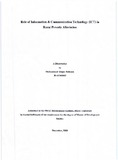| dc.contributor.advisor | Hakim, M. A. | |
| dc.contributor.author | Rahman, Muhammad Atiqur | |
| dc.date.accessioned | 2010-09-27T03:47:23Z | |
| dc.date.available | 2010-09-27T03:47:23Z | |
| dc.date.copyright | 2008 | |
| dc.date.issued | 2008-12 | |
| dc.identifier.other | ID 05362002 | |
| dc.identifier.uri | http://hdl.handle.net/10361/238 | |
| dc.description | This dissertation is submitted in partial fulfillment of the requirements for the degree of Master of Development Studies, 2008. | en_US |
| dc.description | Cataloged from PDF version of dissertation. | |
| dc.description | Includes bibliographical references (page 45). | |
| dc.description.abstract | For lack of access to information, poor people are facing problems in different ways. If the poor people do not know where employment opportunities are available they cannot get employment. A poor farmer needs to know about input and output markets to buy inputs and sell outputs. If a farmer does not know where he will get the appropriate price for his products, he will not get the right price. If he does not know which seeds will be better for his land he will not get the desired yield. If the poor people do not have the information about health related issues and different diseases they will suffer from ill health. This study explores how the poor people are getting information from the different media through Pallitathya Kendras (PKs), and how they are helping them in their efforts to alleviate poverty. Pallitathya Kendras are becoming a model for other entrepreneurs and NGOs because of their reliability for the provision of services in rural areas through advanced ICT tools and channels.
This study finds that when people visit and access information through Pallitathya Kendras they get benefit from them which is reflected in the improvement in their economic status. People do not get economic benefits directly from the Pallitathya Kendras but after using information from Pallitathya Kendras they can improve their livelihoods. If Pallitathya Kendras could have added some more services like: easily searchable local language and mobile infomediary with a bunch of other ancillary services they would have been more helpful for rural poverty alleviation. | en_US |
| dc.description.statementofresponsibility | Muhammad Atiqur Rahman | |
| dc.format.extent | 53 pages | |
| dc.language.iso | en | en_US |
| dc.publisher | BRAC University | en_US |
| dc.rights | BRAC University dissertation are protected by copyright. They may be viewed from this source for any purpose, but reproduction or distribution in any format is prohibited without written permission. | |
| dc.subject | Developmental studies programs. | |
| dc.subject | Poverty alleviation | |
| dc.subject | Information and communication technology | |
| dc.subject | Rural poverty | |
| dc.title | Role of information & communication technology (ICT) in rural poverty alleviation | en_US |
| dc.type | Dissertation | en_US |
| dc.contributor.department | BRAC Development Institute, BRAC University | |
| dc.description.degree | M. Development Studies | |

